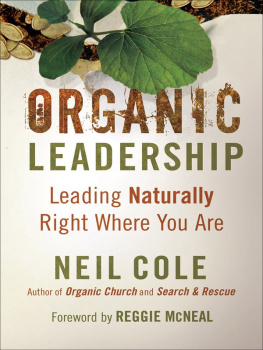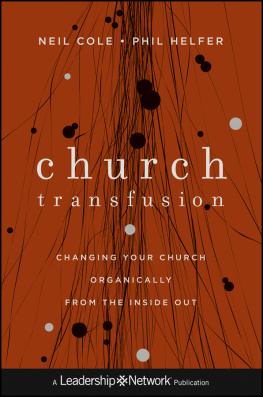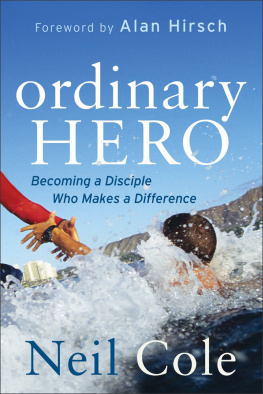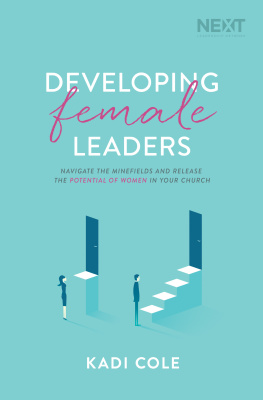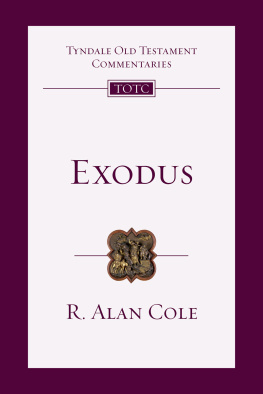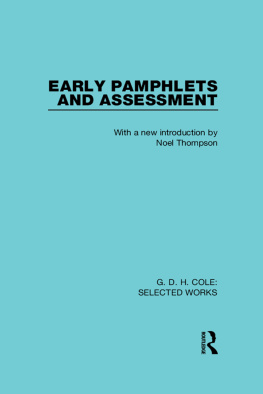This book is a prophetic call for a more discipleship-based, grassroots, and inspirational form of leadership in our time. And it further proves why Neil Cole is one of the most important voices in the Western church today.
Alan Hirsch, author, The Forgotten Ways and ReJesus;
co-founder, shapevine.com
Though I frequently read leadership books, it has been a very long time since Ive read a book on leadership that moved me, challenged me, gave me fresh insights, and went beyond the typical heres how you get it done approach. Neil takes the person, the context, and Gods Word, and mixes them in a powerful way for a life of leadership. Absent from this mix is the Western-driven spirit of how to use people to get your stuff done! This is a book on how leaders do life, develop others, and flow in the kingdom of God.
Bob Roberts Jr., senior pastor, Northwood Church;
author, Transformation and Glocalization
Neil Cole does it again! With prophetic clarity he shares with us an honest look at the sacred cows of church and leadership development in his book Organic Leadership. I enjoy how Neil isnt afraid to examine presuppositions that can paralyze the church, especially since we naturally gravitate toward centralization, institutions, models, and calcified attitudes.
Dave Gibbons, author, The Monkey and the Fish
Neil Cole wants to make the complex simpleand he does it again in Organic Leadership. My head moved a lot as I read the bookmostly up and down, sometimes back and forth. Sometimes I just hung my head, thought, and prayed. Organic Leadership will trouble youbut more importantly, it will challenge you. And you should read it because the church could use some troubling and a new challenge.
Ed Stetzer, author and researcher (www.edstetzer.com)
At the core of my being, I am passionate and committed to getting big kingdom results. So is Neil Cole. In his latest book, Organic Leadership, you will find many additional insights and tools to help you and your church expand your kingdom reach.
Bob Buford, founder, Leadership Network;author, Halftime and Finishing Well
ORGANIC
LEADERSHIP
Leading Naturally
Right Where You Are
NEIL COLE

2009 by Neil Cole
Published by Baker Books
a division of Baker Publishing Group
P.O. Box 6287, Grand Rapids, MI 49516-6287
www.bakerbooks.com
Printed in the United States of America
All rights reserved. No part of this publication may be reproduced, stored in a retrieval system, or transmitted in any form or by any meansfor example, electronic, photocopy, recordingwithout the prior written permission of the publisher. The only exception is brief quotations in printed reviews.
Library of Congress Cataloging-in-Publication Data
Cole, Neil, 1960
Organic leadership : leading naturally right where you are / Neil Cole.
p. cm.
Includes bibliographical references.
ISBN 978-0-8010-1310-2 (cloth)
1. Christian leadership. 2. LeadershipReligious aspectsChristianity. I. Title.
BV652.1.C635 2009
253dc22
2008040240
Unless otherwise indicated, Scripture is taken from the New American Standard Bible, Copyright1960, 1962, 1963, 1968, 1971, 1972, 1973, 1975, 1977, 1995 by The Lockman Foundation. Used by permission.
Scripture marked KJV is taken from the King James Version of the Bible.
Scripture marked NIV is taken from the HOLY BIBLE, NEW INTERNATIONAL VERSION. NIV. Copyright1973, 1978, 1984 by International Bible Society. Used by permission of Zondervan. All rights reserved.
Published in association with the literary and marketing agency of C. Grant and Company.

This book is dedicated to the memory of
Hank Montoya
and all who exhibit a similarly powerful
weakness in the service of our King.
May your tribe multiply in the days that are coming.
CONTENTS
by Reggie McNeal
C opernicus challenged and eventually overturned a millennium of church dogma with his heliocentric view of the solar system. His proofreader was a mathematician and pastor who wrote that the radical model Copernicus was presenting need not be true except as a mathematical model to predict planetary positions in the sky. I guess thats called hedging your bets.
The missional movement currently under way is a similar shift from a church-centric perspective to a kingdom-centric realitya radically different way of seeing the world. It has enormous leadership implications. In the church culture, leadership is unequally distributed, institutionally based, and positionalin other words, clergy dominated and clergy driven. After all, clergy are charged with the responsibility of guiding the church institution, guarding it from doctrinal heresy, and leading it to corporate success. The increasing demands on clergy present a growing issue of sustainability as professional ministry becomes increasingly complex. The good news is, God is not tied to a clergy model in terms of leadership of the movement.
Church-culture leadership focuses on gifts and offices. Through the centuries this has generated a lot of theological discussion and many disagreements between various tribes and traditions. A fair amount of wrangling has occurred over what apostleship entails, whether or not prophets still function, the qualifications of pastors and teachers, and the proper role of evangelists. The wide range of application has created quite a menagerie of church-leader taxonomies, from apostle of apostles to novitiate in monastic brotherhoods and sisterhoods.
In the missional movement, the concept of church shifts from church based to kingdom based. Leadership has to make this shift. Kingdom leadership is widely distributed (across all domains of culturebusiness, education, health care, and so on), organic in its expression (responding to and shaping its environment), and personal in its authority (the leader is the message). It is leadership for a movement, not for an institution.
Kingdom-oriented leadership discussions conjure up results, not offices. These outcomes flow from the characteristics of kingdom leadership that show up in the lives of kingdom leaders. Kingdom leaders are spiritual leaders. To be around them is to be struck with their God dependence and Jesus centeredness. They operate from visionnot one they create but one that translates what God is doing so others can see it and participate in it. These leaders are missional, engaged in the world as partners with God in his redemptive mission that targets all of human experience, not just church life. They develop others, investing in people. Kingdom leadership flourishes in community, frequently deployed and expressed in teams of leaders. And these leaders are not afraid of risk and failure. They are spiritual entrepreneurs, figuring out how the church is expressing itself in todays cultural milieu. They are leading the church that shows up at Walmart, performs in the city symphony, works together in the university research center, collaborates in the movie industry, competes in the sports industry, and yes, gives leadership even in traditional church gatherings.
Neil Cole is giving his life to foster the development of kingdom leaders. While some think he is in the church-planting business, he is really in the leadership-development business. After giving us a view of what the missional church looks like in
Next page
